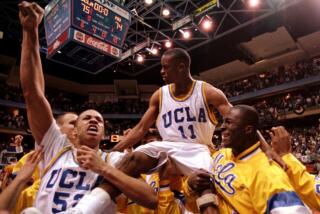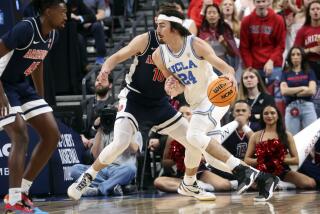He’s Expressing Himself Nicely : Arizona Transfer Mills Still Taunted, but Has Shown He Can Play
- Share via
TUCSON — The heckling began as soon as Arizona forward Chris Mills ran onto the court for a game at Northern Arizona. Fans waved money and displayed open air-express envelopes to taunt him.
A central figure in a recruiting scandal that led to a three-year NCAA probation for Kentucky’s basketball program, which was assessed in 1989, Mills can’t escape his past despite transferring to Arizona.
His troubles began in April 1988 after employees at an Emery Air Freight warehouse in Los Angeles allegedly discovered $1,000 in cash in an opened envelope that that was addressed to Mills’ father, Claud, from former Kentucky assistant coach Dwane Casey.
Perhaps the best City high school basketball player since Crenshaw’s John Williams, Chris Mills was a two-time City player of the year at Fairfax, where he averaged 33 points, 13 rebounds and four assists as a senior. He signed a letter of intent to attend Kentucky, ending an intense recruiting battle involving UCLA, Nevada Las Vegas and Syracuse.
Although the NCAA never directly mentioned Mills in its report on Kentucky’s infractions, he was ruled ineligible to play at Kentucky after the 1989 season as a result of the sanctions that led to the resignations of Coach Eddie Sutton and Athletic Director Cliff Hagan, and the dismissal of Casey, who reached an out-of-court settlement with Emery and was suspended for five years by the NCAA. The terms of the settlement have not been revealed because of a confidentiality clause.
Claud Mills, who maintains his innocence and has offered to take a lie detector test, said it was a setup, adding: “We don’t hold a grudge against anyone, Kentucky, Emery or nobody.”
Tired of answering questions about the incident, Chris Mills seemed as if he was reading from a cue card when asked about his troubled past. If Mills guarded opponents the way he guards his feelings, no one would ever score against him.
“That’s all behind, and I’m happy I’m just here at Arizona,” Mills said. “Well, it’s just one of those things that happened at a younger age and it made me grow stronger as a person.
“I’d rather not discuss it anymore.”
Claud Mills thinks his son has been hardened by controversy.
“When Chris was at Fairfax, he was an outgoing person and he trusted everybody,” the elder Mills said. “He never thought anyone would do anything to him like what happened at Kentucky.
“But it made him grow up. I think it made a better young man out of him because now he understands he can’t open up to everyone. A lot of the media really hurt him. They said a lot of things that weren’t true about him.”
After UCLA decided not to recruit him, Mills transferred to Arizona in June 1989, asking the NCAA to waive its one-year residency requirement for transfers and thereby allow him to play immediately.
Claud Mills maintained that UCLA Coach Jim Harrick wanted Chris Mills, but UCLA Athletic Director Peter Dalis vetoed the idea.
“(UCLA) recruited him heavily after he left Kentucky,” Mills’ father said. “I know Coach Harrick wanted him, but Peter Dalis had something to do with him. He thought it might not be a great thing coming from Kentucky and going to UCLA. We respect him, if that was his belief. We knew Chris was innocent from the get-go.
“But it doesn’t matter if you’re innocent or not, as long as you’re accused. That hurt him. I think he would have gone to UCLA because most (of the Bruin players) are his friends because he played with those guys.
“But we heard they polled some of the players, and a lot of the guys didn’t want him, not because he’s not a good player or good person, but because of playing time.”
Said Harrick: “I made the decision that I wasn’t going to pursue Chris Mills. I didn’t want to have any controversy associated with the program that I was trying to build.”
After meeting with the Mills family’s attorney, Dalis decided against pursuing Mills. “I didn’t think it was in Chris’ best interest and UCLA’s best interest (for him to attend UCLA),” Dalis said.
UCLA forward Don MacLean said the Bruin players never voted on Mills and that he urged Harrick to sign Mills.
In a surprise decision, the NCAA ruled Mills ineligible last season because he had voluntarily transfered to Arizona, even though he was ineligible to play at Kentucky. The NCAA made its recommendation because Mills never appealed his ineligibility at Kentucky.
“I was sort of surprised (by the ruling),” Mills said. “It was disappointing because it was the first time I ever had to sit out. But it helped me a lot because it helped me to learn the system at Arizona, and I did a lot better in the classroom because I was concentrating on studying.”
So Mills sat out last season. He could practice, but he couldn’t play, and he sat on the bench during games, acting as a cheerleader.
Arizona center Brian Williams, who sat out the 1988-89 season after transferring from Maryland, sympathized with Mills.
“It’s difficult when all of a sudden you’re told you can’t play,” Williams said. “You’re kind of unsure and you’re hoping you didn’t make the wrong decision. But it’s also good for finding yourself.”
Arizona Coach Lute Olson, who has developed a reputation for running a program that doesn’t run afoul of the NCAA, was confident Mills would play well after he became eligible.
“I’d watched Chris play since he was a freshman (in high school), so I never felt there was a risk,” Olson said. “I think you can tell more about a kid by watching him play in every kind of situation. So I never saw it as a risk.”
Olson’s players also accepted Mills despite his troubled past.
“I don’t think anyone was (wary) of Mills,” Arizona guard Matt Othick said. “We knew what a talent he was and we knew he’d bring a lot to our program. He’s done nothing but help us, and I think he’ll continue to do that.”
Except for failing to pay several parking tickets that he got for parking his customized sports car in front of McKale Center, Mills hasn’t been in any trouble at Arizona, and coaches and teammates maintain that he has been a model student.
Although Mills was sidelined for 19 months, Wildcat fans had high expectations for the 6-foot-6 redshirt sophomore swingman when he became eligible this season. Some saw Mills as the second coming of Arizona All-American forward Sean Elliott, who led the Wildcats to the Final Four in 1989, and forward Jud Buechler, who guided Arizona to its third consecutive Pacific 10 Conference title last season.
Mills hasn’t disappointed his new team. He scored 29 points and grabbed 13 rebounds as Arizona, currently ranked No. 5, defeated No. 2 Arkansas, 89-77, to win the preseason National Invitation Tournament at New York in November.
Matched against Todd Day, Mills held the Arkansas All-American forward to one point in the second half after Day scored 18 in the first half to help Arkansas take an eight-point lead.
“(Mills) showed me what a big-time basketball player should look like,” Arkansas Coach Nolan Richardson said after Mills was named the tournament’s most valuable player.
Mills also motivated his teammates with an emotional halftime speech, urging them to upgrade their performances in the second half against Arkansas.
“It really helped,” guard Matt Muehlebach said. “He told the guys not to let Arkansas intimidate them, and it turned the whole game around.”
Although Mills has played well in big games and is averaging a team-high 15.6 points and 6.1 rebounds, he has also been quite ordinary at times. A good three-point shooter, Mills occasionally seems reluctant to play inside because he would rather shoot jumpers from outside.
After scoring 21 points in a victory over USC, Mills had a season-low four points in his next game against UCLA.
Claud Mills had a talk with his son after the Bruin game.
“It seemed like he wasn’t playing as if he was having fun,” the elder Mills said. “So I told him if you’re not having fun, there’s no use playing. Go back to your Fairfax days and start having fun and stop thinking about the game.”
Mills has averaged 19 points in the six games since the pep talk. He had 21 points and 11 rebounds, his second-double double of the season, in an 84-71 victory over Washington State last week.
A team leader at Kentucky, where he averaged 14.3 points and 8.7 rebounds as a freshman, Mills has been reluctant to take charge at Arizona, where he’s a new kid on the block.
Olson told Mills to be more assertive.
“Chris can’t be along for the ride,” Olson said to Tucson reporters. “He has to be pulling the wagon.
“I want Chris to play in all phases of the game as well as he can play. I think it’s a matter of him getting into a mind-set where he has to (play well) game in and game out. He’s still a sophomore, eligibility-wise, so that may have something to do with it.
“How good we can be depends on whether he can (play well) Thursday-Sunday or whether it can be Thursday and then not again until the next Thursday.”
Mills said he is looking forward to tonight’s game against USC at the Sports Arena and Sunday’s nationally televised game against No. 14 UCLA at Pauley Pavilion, where Bruin fans are likely to heckle him.
“Chris just turned 21 last Friday, and I think he’s man enough to take it,” Claud Mills said. “If they come out heckling him, a couple three-pointers will stop that. But I think UCLA fans should be worried about trying to win. I saw them the other night and they lost to USC.”
More to Read
Go beyond the scoreboard
Get the latest on L.A.'s teams in the daily Sports Report newsletter.
You may occasionally receive promotional content from the Los Angeles Times.










